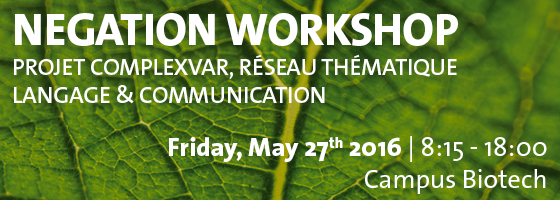
Negation is a universal property of natural languages. Although its logical properties are well known, its linguistic properties are the focus of various research programs and debates, from well-studied languages to less studied ones. Negation shows surprising characteristics at the syntactic, semantic and pragmatic levels. A negative sentence can, for example, have a positive content if it expresses surprise, in contexts where presuppositions are preserved, or in its metalinguistic use.
Negation is also at the core of psycholinguistic research programs interested in timing constraints in the processing of negation. A key question is whether negative sentences are processed incrementally, or whether they first give rise to a positive interpretation before accessing the negative content. Experimental psycholinguistics and computational models bring interesting new answers to these questions.
Five international experts in the fields of linguistics (syntax, semantics, pragmatics), experimental psycholinguistics and computational modeling will take part in the Workshop, in order to share perspectives on the topic. The Workshop is open to the public, but requires registration because it takes place on the Campus Biotech whose access necessitates a badge. Please note that registration is mandatory even if you only attend one talk.
Please note that the deadline for registrations is May 24th.
Program :
8.15 : Registering at Campus Biotech
8.45 : Introduction
9.00 – 10.00 : B. Spector (Département d’Etudes Cognitives, ENS): Is metalinguistic negation really responsible for unexpected interpretations? Abstract Slides
10.00 – 10.30 : Coffee break
10.30 – 11.30 : B. Kaup (LEAD Graduate School, Universität Tübingen): The processing of negative sentences: How does negation influence simulation processes during comprehension and when is the pragmatics of negation taken into account? Abstract
11.30 – 12.30 : R. Breheny (Psychology and Language Sciences, University College London): The State of Our Inquiry ‐ Representing Context for Negation Abstract Slides
Lunch at the cafeteria of Biotech
14.00 – 15.00 : A. Moro (Institute for Advanced Study, IUSS Pavia): Surprise Negation Sentences Handout
15.00 – 16.00 : R. Levy (Brain and Cognitive Sciences, MIT): Negation in probabilistic models of language comprehension: structure, expectations, and pragmatics
16.00 – 16.30 : Coffee break
16.30 – 18.00 : Discussion panel
